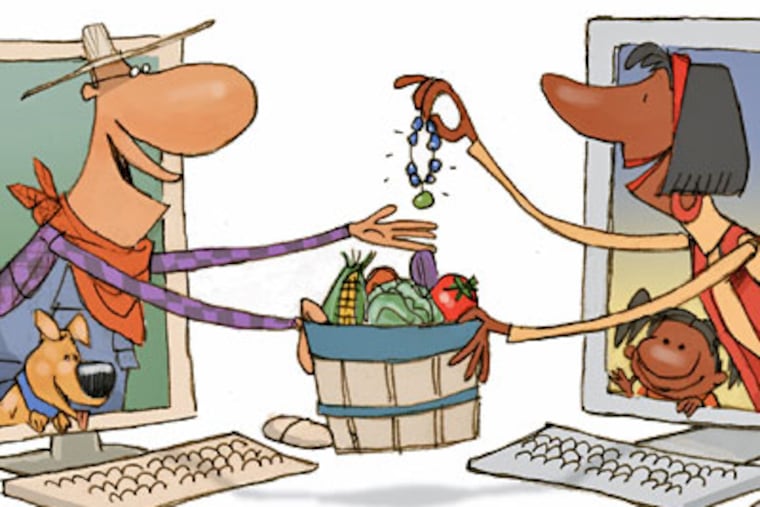To barter successfully, use contracts, caution
Bartering, the trading of one product or service for another, with no money involved is an ancient system that's taken on new importance among today's cash-strapped consumers.

Remember when you were a kid and you coveted the cool baseball glove your friend had, but you didn't have the money to buy it from him?
If you had a great train set, you may have offered to trade that for the glove.
You were engaged in bartering, the trading of one product or service for another, with no money involved.
It's an ancient system that's taken on new importance among today's cash-strapped consumers.
"The fact that people feel strapped for cash and because the credit environment is still quite difficult for many people, any execution that allows them to get something they want without paying cash is something they are much more willing to explore," said Michael Satz, chief executive of BarterQuest.com.
The number of postings on the Web site, where consumers can post their wants and offers for bartering, has soared more than 350 percent since it launched last December, Satz said.
"We've been averaging 30,000 monthly visitors to the site," he said.
To be successful at bartering, you need to remember that it's a business transaction.
"Make sure you have a definite idea of what it is you're offering," said Melissa Massello, editor-in-chief of Shoestring Magazine, an online publication that focuses on budget living.
"Be very descriptive with the details of the goods you're offering. Don't say, 'I'll photograph your wedding.' Say, 'I'll photograph your wedding for four hours, (and) you can keep the original images to make prints from.' "
Rose Murphy of McKinney, Texas, posted an offer on Craigslist to do four hours of housecleaning or pet care in exchange for a professionally crafted resume.
"I had seen the category on there and I thought it would be creative to get a well-done resume," said Murphy, a first-time barterer.
The more details you supply, the greater chance you'll get what you want.
"Use the same protocol as you would if you were buying or selling, so people have a tangible idea of what they're getting, because once you assign value to something, there's more of an opportunity for an even exchange," Massello said.
Much of what's considered a fair exchange is subjective.
"Be flexible, be creative, and value your own instinct as to what is a fair trade, because you ultimately determine that," Satz said. "In trading, this is a direct exchange of something that has a certain value to you and me."
But there's one thing that isn't subjective: Uncle Sam will want his share of the deal.
If you barter products or services through a barter exchange, which functions primarily as a marketplace for members, you should receive a Form 1099-B, "Proceeds From Broker and Barter Exchange Transactions."
Your proceeds, the amount shown in Box 3 of the form, are generally reportable as income and must be included on your federal income tax return.
Barter exchanges are generally required to issue Form 1099-B annually to their clients or members and to the Internal Revenue Service.
This applies whether the bartering operates out of a physical office or on the Internet.
Barter dollars, or trade dollars, are identical to real dollars for tax reporting, the IRS said.
"If you conduct any direct barter - barter for another's products or services - you will have to report the fair market value of the products or services you received on your tax return," the IRS said.
For example, if you're a plumber and you do repair work for a dentist in exchange for dental services, both parties must report as income the fair market value of the goods and services exchanged.
When bartering, take the necessary precautions to protect yourself.
Mary Spector, who teaches consumer law at Southern Methodist University's Dedman School of Law, said both parties should draw up a contract, being as specific as possible. She used Murphy's posting as an example.
"She would want to be very careful by what she means by four hours of pet care," said Spector. "Would that mean grooming the pet? Walking the pet? How many pets would be involved? Is it just dogs or would it be dogs and fish?"
And the resume writer? "How many drafts is the person going to do?" Spector said. "Will she have an opportunity to proofread it and make additions? What sort of turnaround time is she talking about?"
Deal with local businesses or individuals when answering a Craigslist ad, said Jeannette L. Kopko, spokeswoman for the Better Business Bureau of Metropolitan Dallas.
"Regardless of the reason given, never wire money as payment through services such as MoneyGram or Western Union unless the recipient can be trusted," she said. "Schemers may use some reason to ask for payment sent by wire, and victims may be unable to get their money back."
Never give out financial or personal information, such as bank account numbers or your Social Security number.
Also, understand that sometimes bartering just doesn't work out.
Murphy said she hasn't received any legitimate responses to her posting.
"So far, nothing is working, and I am getting discouraged," she said.
(c) 2009, The Dallas Morning News.
Distributed by McClatchy-Tribune Information Services.